“Every theatre is a madhouse, but opera is the ward for the incurable,” claimed Franz von Dingelstedt, the first director of the Court Opera House in Vienna. And he was right, for once someone’s fallen in love with opera, that’s it. Opera’s a stepchild of the Renaissance, with a Baroque wet nurse: it was on the cusp between these two great eras that the idea of purely sung theatre saw the light of day. Step by step, composers taught the art of singing to classical gods and brave women, Christian heroes and pagan enchantresses, a Seville barber, a Babylonian king and the Czech Mařenka and Jeník. But it was only here in Brno, thanks to Leoš Janáček, that truly psychological musical drama was born, drama that sees into a person’s heart. Today the Brno opera company has its home in a theatre named after Janáček, mounts a major festival devoted to the city’s most famous composer every two years, and has set its sights very high. “The more opera is dead, the more it flourishes,” pronounced the philosopher Slavoj Žižek when speaking of this fanatically loved but just as fanatically rejected genre. By this measure, opera in Brno these days must have been dead at least a dozen times.
From Tavern to the World of Opera
Most projects in Bohemia and Moravia begin their life in pubs. On the site of today’s Reduta theatre there once stood the Theater in der Taffern, and it was there that the first opera performances in Brno took place. Among the earliest was Domenico Sarro’s Didone abbandonata. In 2014 the local Opera on the Move gave a revived premiere of the work in today’s recently refurbished Reduta. In the intervening period, much had occurred: among other things, the Brno opera company had acquired a theatre boasting the largest stage in the Czech Republic, named after Leoš Janáček. The world premieres of all of his operas but one, The Excursions of Mr Brouček, had taken place in Brno.
The outstanding conductor and Janáček specialist Jaroslav Vogel once remarked that Jenůfa is The Bartered Bride in a minor key. This witty comment also makes the less obvious point that Janáček enjoyed a similar position in Brno to that of Smetana in the country as a whole. But for a long time Janáček was regarded from outside as a local oddity, until his oeuvre was introduced to the world first by Max Brod and much later by the conductor Charles Mackerras (1925–2010) and the musicologist John Tyrrell (1942–2018). The former recorded Janáček’s operas for Decca, the latter was the preeminent Janáček scholar. The Czech translation of the first volume of his definitive biography of Janáček, running to around one thousand largeformat pages, was published in 2018 by the
One City, German and Czech Opera Companies
For a long time opera in Brno mirrored the relations between its Czech and German speakers. The first operas in Czech appeared around 1840, among them Žižka’s Oak, by the Brno composer František Kott. The years when Czech operas scraped along in the German theatre ended with the establishment of the Czech Provisional National Theatre in 1884. This came two years after the opening of the new German Stadt theater, today’s Mahen Theatre the first Central European theatre fully lit by electricity.
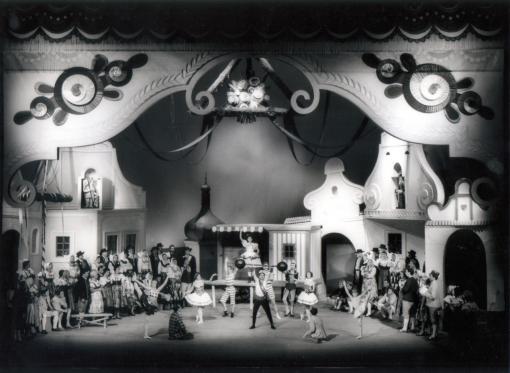 A 1977 production of The Bartered Bride. Photo: NDB archives
A 1977 production of The Bartered Bride. Photo: NDB archives
After the creation of independent Czechoslovakia in 1918 the municipal theatre came into Czech hands, and the Czech and German companies agreed to alternate there. The most distinguished head of the opera company in the interwar period was František Neumann (1874–1929), a workaholic who in addition to intensive staging of operas by both Czech and foreign composers also introduced concert cycles.
Ivo Váňa Psota was another newcomer to Brno in the interwar period, first as ballet master and, later, head of the ballet company at the National Theatre in Brno. It was thanks to him that the premiere of Sergei Prokofiev’s ballet Romeo and Juliet took place in Brno.
Neumann was the first eminent personality to enjoy the height of his career in Brno; many others began here and then moved on. Among them was the worldfamous heroic tenor Karel Burian (1870–1923), who made his debut in Brno in 1891, as did his younger colleague Leo Slezak (1873–1946) four years later.
Magdalena Kožená’s debut was also with the Brno opera. The famed Maria Jeritza (1887–1982) was born in Brno, though she never sang as a soloist here. The early careers of several conductors played out in Brno, among them Rafael Kubelík, Václav Neumann and Zdeněk Chalabala. Another great era for opera occurred from 1953 to 1978 under František Jílek (1913–1993).
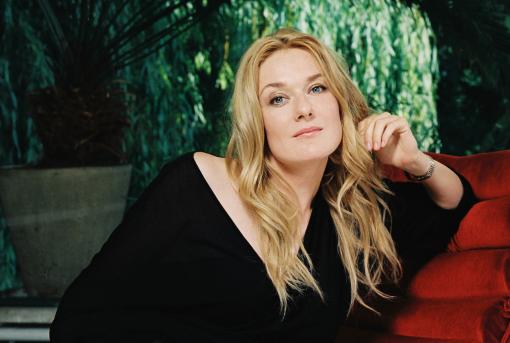 Magdalena Kožená. Photo by: MCSH Brno
Magdalena Kožená. Photo by: MCSH Brno
Opera in the Theatre, on the Stairs and at School
In the course of the quarter century he was active in Brno, Jílek raised opera standards here to the highest level. He devoted much time to Janáček (hardly surprising), but also to the work of Bohuslav Martinů definitely not a given under Communism, as Martinů was still regarded with suspicion as an emigré. Jílek also conducted ballets and among other things shaped a ballet form for Capriccio for Cello and Orchestra by Jan Novák (1921–1984). A brilliant Brno composer, Novák later emigrated; in the past twenty years his work has been enjoying a renaissance. His cousin Richard Novák is a Brno opera legend, still singing at the age of eightyeight.
Novák’s compositions are favourites with Brno’s Ensemble Opera Diversa, which launched itself by staging minioperas on the stairs of the Spolek café, gradually developing into a stable yet flexible chamber ensemble with original operas and musical compositions in its repertoire.
In 1957, on the initiative of the director Miloš Wasserbauer (1907– 1970), the JAMU Chamber Opera was formed. It carried out its projects in today’s Barka Theatre, but in 2012 acquired a new space, the Theatre on Orlí. Hausopera, a group focused on sitespecific productions, launched its activities in 2018 with an opera set in a swimming pool.
A Fairytale about Thirteen Bosses and One Festival
After Jílek’s departure opera fell into eclipse, and the situation only worsened in the period of turbulent change following 1989. For a long time people still looked back nostalgically to Václav Věžník’s stirring Communistera production of Nabucco, with its theme of longing for freedom. But the main feature of opera in Brno post 1989 was instability: between 1991 and 2014 the company ran through no fewer than thirteen heads. Calm, and a sharp and rapid rise in standards, only came with the appointment of Martin Glaser as head of the National Theatre and Jiří Heřman as head of its opera company.
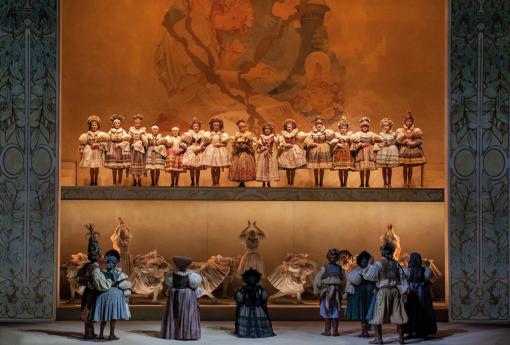 The Janáček Brno festival guest company staging of Jenufa. Photo: Magdalena Osko
The Janáček Brno festival guest company staging of Jenufa. Photo: Magdalena Osko
Their greatest success so far has been the biennial Janáček Brno festival, whose quality they improved so markedly that it won in the “Festival of the Year” category at the prestigious International Opera Awards competition. Both men were present to accept the prize at the awards ceremony in London in April 2019.
Josef Pančík: Attaining Excellence Through Concert Singing
By definition, an opera theatre must have a chorus. So here we turn to the superb choir master Josef Pančík, who enjoys the reputation of having created the best opera chorus in the Czech Republic, and indeed one of the best in Europe.
”For me, the miracle of the Brno chorus lies in how Pančík manages to maintain its high standards,” says the bass Richard Novák when speaking of his longtime colleague. “The chorus is the most sensitive element – newcomers to the chorus are fresh out of the conservatory, they don’t know anything, they have a bit of a voice, and then they listen. And they absorb techniques and become one with the chorus. The body of the chorus is renewed over the course of twenty years, but its spirit remains one and the same.”
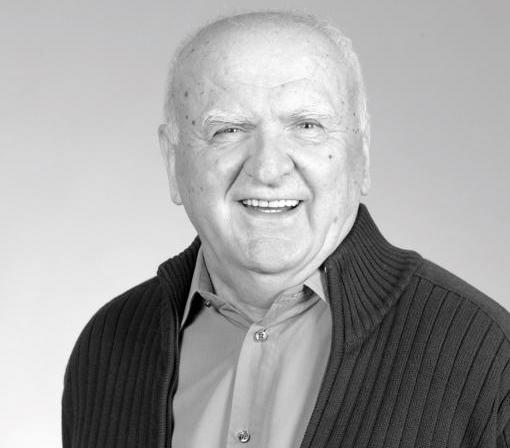
The main strength of the Brno opera chorus has always been its cultivated expression, which Pančík has maintained by, among other things, creating a concert repertoire. Opera choruses often mask minor shortcomings behind the noise of the orchestra. Pančík’s chorus knows how to sing demanding compositions without an orchestra, as a purely concert group.
But the opera chorus in Brno has a long tradition both Leoš Janáček and his teacher Pavel Křížkovský were accomplished choirmasters. The father of the modern choir tradition in Moravia was Ferdinand Vach (1860-1939), who founded the Moravian Male Teachers’ Choral Society unquestionably the country’s most famous men’s choir. Janáček, known for his highly critical comments, wrote of Vach “I dedicate to him not one, but all of my choral works.”
The concert counterpart to the opera chorus is the Czech Philharmonic Choir of Brno, founded and led by Petr Fiala. Kantiléna is an outstanding choir for children and young people.
In Brno alone more than sixty groups foster choral singing, a figure that doesn’t include church choirs; a list of them all, with short descriptions of each, would fill a book one still waiting to be written.





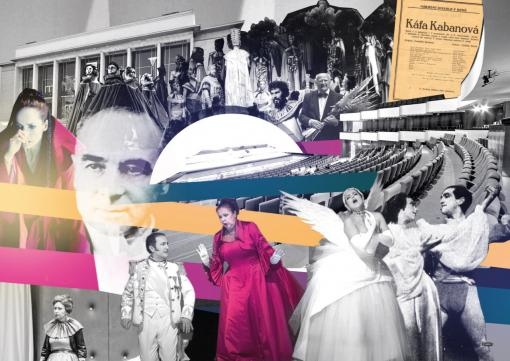



























No comment added yet..